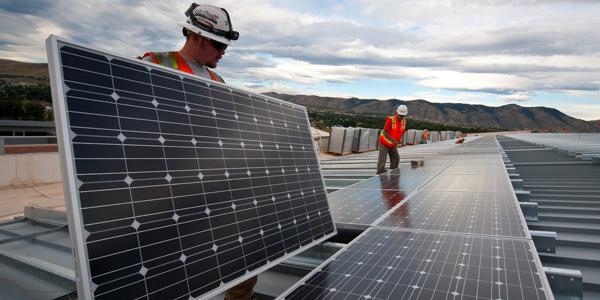By Jason Fordney
President Trump’s new tariff on imported solar cells and modules will slash domestic solar output by 6.7 GW by 2021 and wipe out tens of thousands of jobs, a major solar trade industry association said Tuesday.
“We are not happy with this decision,” Solar Energy Industries Association (SEIA) CEO Abigail Ross Hopper said during a conference call.
The move could have a “significant impact” on new solar markets and eliminate 23,000 U.S. manufacturing jobs this year, Hopper said. She anticipated the decision could spur a complaint with the World Trade Organization over the tariff, and “we should be watching with great interest should another country choose to pursue that path.”
“This administration really grappled with understanding that solar is creating jobs,” Hopper said.
Bill Vietas, president of RBI Solar in Cincinnati, Ohio, said: “There’s no doubt this decision will hurt U.S. manufacturing, not help it. The U.S. solar manufacturing sector has been growing as our industry has surged over the past five years. Government tariffs will increase the cost of solar and depress demand, which will reduce the orders we’re getting and cost manufacturing workers their jobs.”
But the Trump Administration contends that China has used its own incentives and subsidies to flood the United States with underpriced solar cells and modules, hurting domestic manufacturers. Based on recommendations from the International Trade Commission (ITC), the tariff starts at 30% for the first year and drops by 5% each year over the following four years, with the first 2.5 GW of imported solar equipment exempt.
The White House on Monday issued an announcement from U.S. Trade Representative Robert Lighthizer that Trump approved the ITC’s recommendation to impose the tariff on imported solar cells and modules, as well as washing machines. ITC found that “artificially low” priced solar cells and modules from China has spurred solar growth in the United States and that China has used incentives, subsidies, and tariffs of its own to dominate the global solar equipment supply chain.
Chinese manufacturers’ share of global solar production grew from 7% in 2005 to 61% in 2012, according to U.S. government statistics. The United States imposed anti-dumping and other duties in 2012 and 2013, but Chinese producers evaded those tariffs by moving production to other countries.
“The ITC determined that increased solar cell and module imports are a substantial cause of serious injury to the domestic industry,” the White House said. “Although the commissioners could not agree on a single remedy to recommend, most of them favored an increase in duties with a carve-out for a specified quantity of imported cells.”
Prices for solar cells and modules fell by 60% between 2012 and 2016, and “by 2017, the U.S. solar industry had almost disappeared, with 25 companies closing since 2012. Only two producers of both solar cells and modules, and eight firms that produced modules using imported cells, remained viable,” the notice said.
The tariffs are not as high as those proposed by solar companies Suniva and SolarWorld Americas. ITC initiated the investigation in May 2017, after Georgia-based Suniva filed a petition citing domestic solar industry job losses and wage declines. The company, majority-owned by privately-held Chinese firm Shunfeng International Clean Energy, declared bankruptcy last April.
SEIA said that out of 38,000 solar manufacturing jobs in the United States, all but about 2,000 make something other than cells and panels, producing products such as “metal racking systems, high-tech inverters, [and] machines that [improve] solar panel output by tracking the sun and other electrical products.”
Section 201 of the Trade Act of 1974 authorizes the president to create tariffs or take other actions in response to an ITC determination that increased imports are a substantial cause of serious injury to domestic producers.





